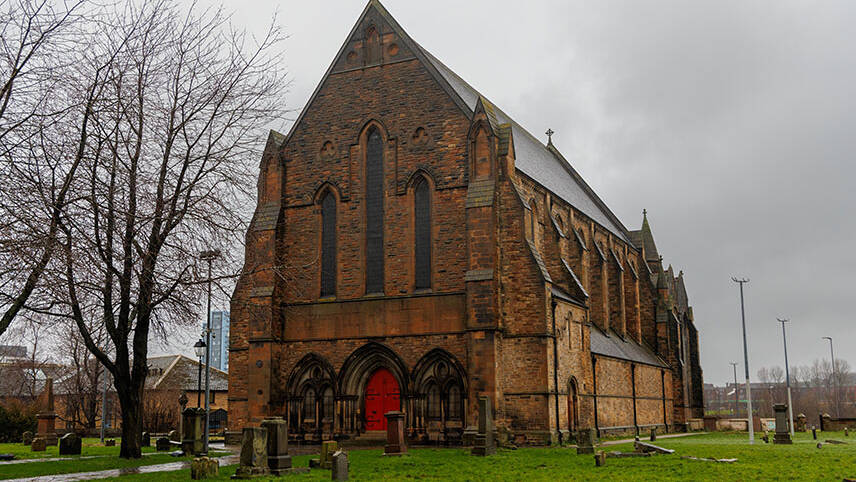This premium content is exclusive to edie Members.
To find out more about edie Membership, please click below.
If you are an existing member, login here

Image: SP Energy Networks
At a Glance
Who: SP Energy Networks and Govan Heritage Trust
What: Heating a historic church using a river source heat pump
Where: Govan Old Church, Glasgow, Scotland
Why: To reduce carbon emissions, save energy costs and support community heritage preservation
The Challenge:
The challenge faced by Govan Heritage Trust and the local community is the preservation and promotion of Govan Old Church and its invaluable collection of Govan Stones. These 31 carved stones, dating back to the Viking era between the 9th and 11th centuries, represent a crucial archaeological site in Glasgow’s history.
However, the accidental destruction of some stones in the 1980s during the nearby shipyard demolition underscored the fragility of this heritage site. Since then, the Trust and the community have grappled with the task of preserving and promoting the site amidst environmental and economic challenges.
The Solution:
In the pursuit of sustainable preservation, Govan Heritage Trust aims to implement sustainable upgrades to Govan Old Church, aiming to reduce carbon emissions and energy costs while preserving its historical significance and supporting community initiatives.
As one of the recipients of SP Energy Networks’ Net-Zero Fund, a £5m initiative designed to support vulnerable communities across Central and Southern Scotland on their journey to net-zero emissions, the Trust has received essential support.
Through the Fund’s grant, a new river source heat pump will be installed, aiming to significantly reduce carbon emissions and energy costs for Govan Old Church.
How the Project Works:
The project involves installing a river source heat pump to harness energy from the river Clyde, providing sustainable heating for Govan Old Church while reducing carbon emissions. The church is being transformed into a museum to showcase the site’s heritage and expects to welcome over 14,000 visitors each year.
The funding will also offer renovations to create a meeting space for local organisations and charities catering to elderly and isolated members of the community, groups welcoming and supporting refugees, organisations working with Govan’s youth and local schools looking to learn about heritage. Alongside financial support, the fund also offers guidance and support through workshops tailored to community organisations and charities looking to decarbonise.
The Results:
The results of the project are multifaceted. The project is expected to reduce carbon emissions by more than 90% and save 20% in energy costs for Govan Old Church, contributing to environmental sustainability and cost savings.
Concurrently, the transformation of the church into a museum has already begun to attract an annual footfall of more than 14,000 visitors, contributing to the cultural enrichment of the local community. Renovations will also successfully create a versatile meeting space, supporting various community initiatives.
Business Benefits:
The initiative brings multiple benefits to Govan Heritage Trust, including lower emissions, reduced energy costs and improved infrastructure, enabling it to focus on heritage preservation and community engagement.
Investment/Savings:
The project received £150,000 in funding from SP Energy Networks’ Net-Zero Fund, to facilitate significant reductions in carbon emissions and energy costs for Govan Old Church.
Industry Context:
SP Energy Networks aims to support vulnerable communities across Central and Southern Scotland in their transition to net-zero emissions, aligning with broader industry efforts to promote sustainability and combat climate change.
Scotland has set an ambitious net-zero emissions target for 2045, surpassing the UK and various other nations with a target date of 2050.
© Faversham House Ltd 2024 edie news articles may be copied or forwarded for individual use only. No other reproduction or distribution is permitted without prior written consent.

